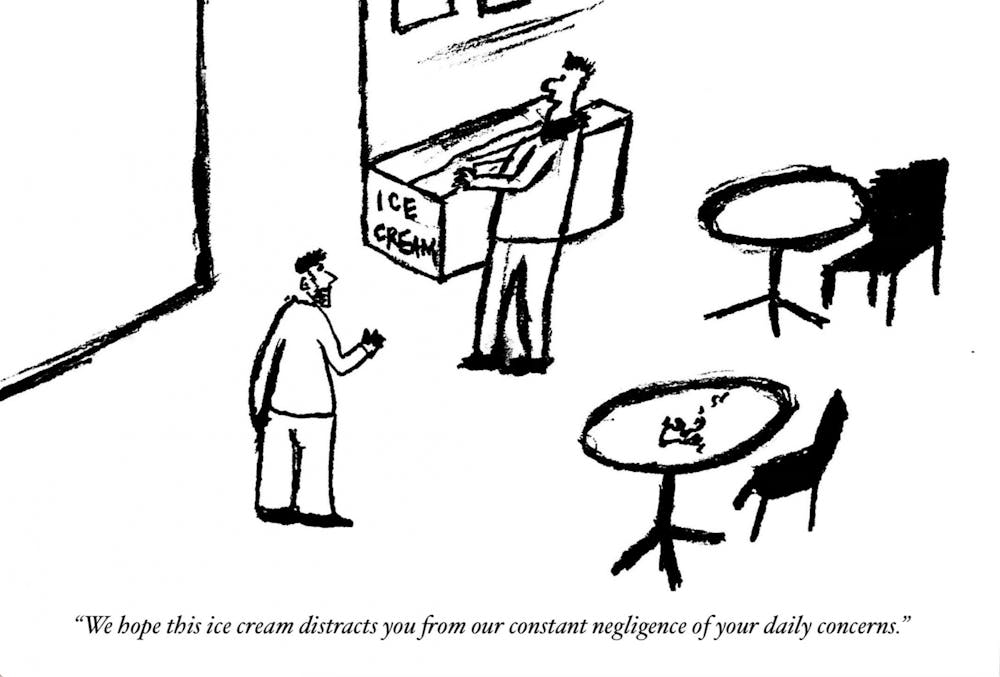We have come to the end of another semester at Hopkins. Reflecting on the past three months, we ask the question: Has the University eased our transition to a “new normal?”
Early this fall, we expressed uncertainty about the logistics surrounding our return to Baltimore. Over the semester, we’ve seen the challenges of Zoom University replaced by issues with on-campus housing, University-sponsored transportation and sporadic WiFi outages. And of course, the continued discovery of new variants of the SARS-COV-2 virus have left us just as, if not more, uncertain than before.
Residents of on-campus housing buildings, which sat vacant during the pandemic, have had to deal with pipes that burst or leak, elevators that seem to always be “out of service” and pests in their room. Outside the dorms, affiliates continue to face challenges with inaccessibility; The new student center construction still presents an obstacle for those who require wheelchairs or other mobility accommodations.
It is vital to resolve these matters as we progress into next semester.
We recognize the University’s commitment to the health of our community. Regular testing and vaccination requirements have assuaged some of the anxiety students have felt about returning to campus during a pandemic. We do not take this for granted and are aware that many communities do not have the luxury of regular testing and adequate vaccine supplies.
Though we appreciate the University’s robust public health practices, many of the questions we’ve asked this semester remain unanswered, and new concerns have surfaced.
Over Thanksgiving break, Hopkins required that students who would be on campus during any part of break still get tested; however, the limited hours of testing sites made this difficult for those who left campus before break started or returned before it ended. This rendered some noncompliant, unable to access campus until testing resumed. Once again, we’re seeing students penalized for not having the opportunity to follow rules set by the University.
In light of the evolving COVID-19 variants, students would also appreciate guidance on whether the University will require booster shots and how it will help students receive them. Knowing the issues students have faced getting flu vaccines, we hope that accessibility is considered when setting a deadline.
More detailed communication from the administration is vital for the student body to act in an informed manner. Communication is also a two-way street: The University must be receptive to the wants and needs of the student body. Since our return to campus, we’ve been able to organize and assemble in-person, calling out the University’s shortcomings in real time.
This fall, trans students and allies, in partnership with Teachers and Researchers United (TRU) and the Hopkins Minorities and Philosophy Chapter, demanded that the University prove its dedication “to being an inclusive campus.” Last month, during the Not My Campus protest, students hosted a vigil for survivors of sexual assault and protested the University’s handling of an alleged incident of intentional drugging.
Although Hopkins apologized for its initial, victim-blaming statements in response to the alleged intentional drugging, it remains to be seen if demands for a more safe and inclusive campus will be met.
Students are aware of the issues at our institution, and we refuse to let the administration brush them aside.
Earlier this semester, we predicted students would experience bouts of burnout and fatigue due to the loss of fall break. Shocker – we were right. Our exhausted student body is a testament to why we need to reset campus culture. We continue to stand by this call and hope to achieve this once we return from the much-needed winter break.
Despite this, we must recognize the progress that has been made since coming back to campus. The simple act of engaging in a seminar discussion, face-to-face, reminds us of pre-pandemic college life. We’re grateful to be able to once again use campus resources and facilities: We at The News-Letter are happy to be back in the Gatehouse and publishing print magazines (Pick up your own copy of our fall magazine around campus!).
For many students, this semester is their first experience with campus life and Baltimore. We are glad to see people popping the Hopkins Bubble in ways they could not virtually. We hope to continue to enjoy each other's company and the physical spaces of campus next semester as we move toward our new normal. However, our campus culture will not change unless the administration engages with students to address our concerns.
As we’ve seen during these “unprecedented times,” Hopkins can change. It’s time for the University to hear our voices and act accordingly.





